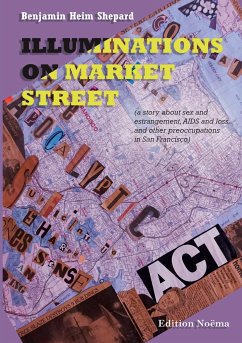San Francisco in the early 1990s. Cab is on the deep end of a losing streak. After having been dumped yet again, he moves to Haight-Ashbury fresh out of college. It is the middle of a recession, before the dot-com boom, and AIDS is an immediate and untreatable reality. He finds himself working in a housing program for people with HIV/AIDS. The entire city is reeling. His clients are dying. Cab records their every word. He starts drafting a narrative of every person with whom he's slept: those who dropped him, those he adored, and those he let go of without a second thought, to reassess what he has left behind from the South of his childhood of dyslexia and infatuations, football and ecstasy, divorce and sex panics. In between girlfriends, acting up, attempts at romance, and trying to find his place in the greater San Francisco narrative, Cab is looking for something, tracing the interconnecting stories of the people he's meeting, sleeping, and drinking with, as everyone tries to find a space in the city. As treatments emerge and the economy changes, a new story takes shape in Cab's life and the city.
[O]nly Benjamin Shepard, who links personal narrative and movement analysis with uncommon felicity, uses his own experiences to significantly deepen his article's insights. - Geoffrey Kurtz, review of Teamsters and Turtles?: U.S. Progressive Political Movements in the 21st Century Edited by John C. Berg, for Logos, Logos 2.4 - Fall 2003 Benjamin Heim Shepard's beautifully composed, and wonderfully moving White Nights and Ascending Shadows: An Oral History of the San Francisco AIDS Epidemic is a fine and telling history of how one city faced-and still faces-the endless effects of AIDS. - Michael Bronski, The Guide, Summer 1998








